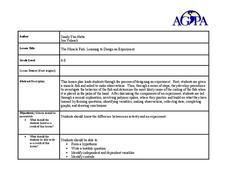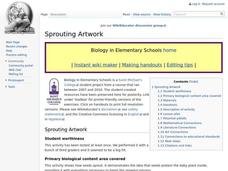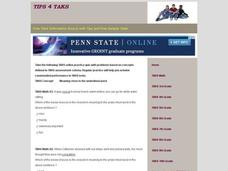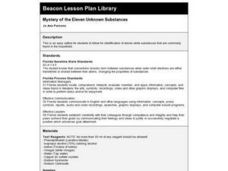Curated OER
Microbes and Health
Students participate in activities that show them how tiny germs are spread. In this germs lesson plan, students engage in hands on lessons to show them how microorganisms can easily spread disease through the mouth and hands.
Curated OER
Acids, Bases, Acid-Base Reactions
In this chemistry worksheet, students read and study the chapter to answer 110 problem solving and short answer questions related to acids and bases.
Curated OER
Esters: The Secret of Natural and Synthetic Fragrances
Students investigate esters, make an ester and detect esters in natural foods and plants. In this esters lesson plan, students detect smells of hidden objects, produce an ester using peas, brown sugar and apple and demonstrate how to...
Curated OER
Make Sense of Nature
Learners participate in this program that heightens their awareness and curiosity of nature as well as their sense of adventure and exploring new surroundings. They identify and choose an object from nature after exploring it with other...
Curated OER
Hatching chickens
Learners recognize the need for gentle care of eggs. In this chicken hatching lesson, students observe the process of incubating eggs for hatching. Learners find the materials needed to properly care for the chicks. Students complete a...
Curated OER
An Egg is Quiet
Students discover information about animal eggs by reading the book, An Egg is Quiet. In this animal science lesson, students research different animals to find out what their eggs look like. Students use a provided chart to guide...
Curated OER
Conversion of Glucose to Fructose
In this enzymes worksheet, learners conduct an experiment to show how enzymes can be used to convert glucose to fructose. This worksheet has 1 short answer question.
Curated OER
The Miracle Fish: Learning to Design an Experiment
Students develop procedures to explore the behavior of fish. In this scientific experiment lesson students from a hypothesis, write a question, identify different variables and controls in their experiment.
Curated OER
Monomer and Polymer Chemistry
Students explain monomer/polymer chemistry of starches and sugars.
Curated OER
Sayings Quiz: Talking 1
In this English idioms quiz about talking, students interpret sayings about talking and complete sentences using them correctly.
Curated OER
Advanced Critical Reading: Salt
In this critical reading learning exercise, students read a passage regarding salt then answer three questions based on the reading.
Curated OER
Sprouting Artwork
Students complete activities to study seeds sprouting and plant growth. In this plant science lesson, students use mustard seeds and sponges to study the seed sprouting process. Students observe their seeds for several days and complete...
Curated OER
TAKS Quiz-Word Meaning
In this TAKS quiz learning exercise, learners take an online quiz focused on word meaning similar to an underlined word. Quiz may be graded online by clicking a link.
Curated OER
Physical vs. Chemical Change Lab
Students recognize both a physical and chemical change in different substances. They determine which particles actually changed into different substances, and explain if it represented a physical or a chemical change.
Curated OER
Taster/Non-taster Lab Activity
Students determine if they are tasters or non-tasters and then replicate the experiment with family and peer group members. They collect data from the experiment to determine which trait is dominant.
Curated OER
Mystery of the Eleven Unknown Substances
Fourth graders identify eleven white substances that are commonly found in the household. They, in pairs, perform experiments on a variety of substances, and must identify them based on the reactions they observe.
Curated OER
Microbes and Health
Sixth graders become acquainted with the concept of how microorganisms cause disease. They role play that some class members have exhibited some alarming symptoms. Groups must determine which disease the symptoms are pointing to.
Curated OER
Physiology Activity Perception and Behavior
Students conduct an experiment to determine a fly's ability to detect sugar, its behavioral response, how a previous experience may alter the response, if a fly can be tricked, and how human sensitivity compares to a fly.



















